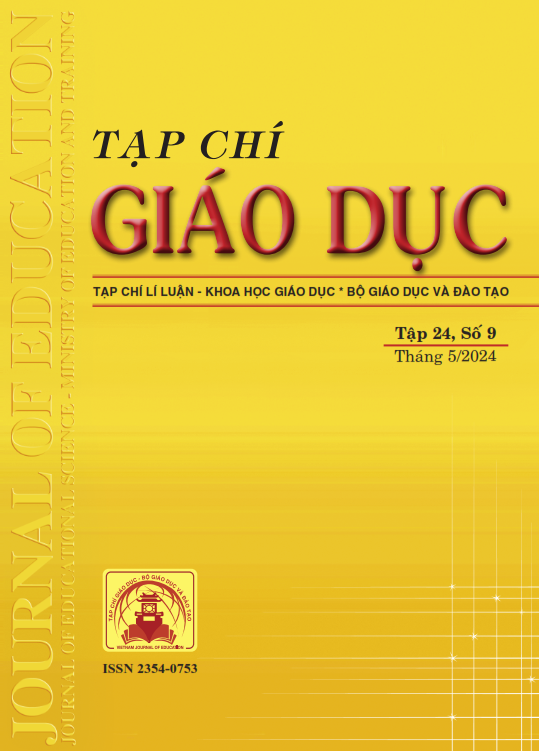Xây dựng chương trình trải nghiệm STEM môn Khoa học tự nhiên lớp 6: Nghiên cứu tại thành phố Phúc Yên, tỉnh Vĩnh Phúc
Tóm tắt
STEM instruction in secondary schools are being organized primarily in the direction of experiential learning. However, the development of STEM experiential programs has received inadequate attention from teachers. This article aims to provide instructions for designing a STEM experiential program so that teachers can possibly develop their own. The study looks into guideline documents concerning the implementation of STEM Natural Science 6 education in schools and deploys theoretical research approaches. According to research findings, there are four major processes in STEM experiential design: 1) scenario analysis; 2) establishing a STEM education plan; 3) evaluating and completing; and 4) approval and deployment. Program development requires resources, time, creativity, and flexibility when designing and organizing STEM experiential activities to optimize how to integrate experiential activities into STEM lessons effectively while still ensuring maximum enhancement of students' capacity to apply knowledge into practice.
Tài liệu tham khảo
Australian Council for Educational Research (2018). Challenges in STEM learning in Australian schools.
Bộ GD-ĐT (2018a). Chương trình giáo dục phổ thông môn Khoa học tự nhiên (ban hành kèm theo Thông tư số 32/2018/TT-BGDĐT ngày 26/12/2018 của Bộ trưởng Bộ GD-ĐT).
Bộ GD-ĐT (2018b). Chương trình giáo dục phổ thông - Chương trình tổng thể (ban hành kèm theo Thông tư số 32/2018/TT-BGDĐT ngày 26/12/2018 của Bộ trưởng Bộ GD-ĐT).
Bộ GD-ĐT (2019). Tài liệu tập huấn về giáo dục STEM trong giáo dục trung học.
Bộ GD-ĐT (2020a). Công văn số 3089/BGDĐT-GDTrH ngày 14/8/2020 về việc triển khai thực hiện giáo dục STEM trong giáo dục trung học.
Bộ GD-ĐT (2020b). Hướng dẫn giáo dục STEM lớp 10 (Tài liệu dành cho cán bộ quản lí, giáo viên cấp Trung học phổ thông).
Bộ GD-ĐT (2020c). Công văn số 5512/BGDĐT-GDTrH ngày 18/12/2020 về xây dựng và tổ chức thực hiện kế hoạch giáo dục của nhà trường.
Bybee, R. W. (2010). Advancing STEM education: A 2020 vision. Technology and Engineering Teacher, 70(1), 30.
Chen, D. J., Lutomia, A. N., & Pham, V. T. H. (2021). STEM Education and STEM-Focused Career Development in Vietnam. In Palgrave Macmillan Asian Business Series (pp. 173-198).
Department of Technology, Management and Budget (2017). MiSTEM Network Plan.
Dung, T. M., Thu Huong, V. N., & Thi Nga, N. (2020). Teachers and STEM education: collaboration across disciplines and implementation of lessons in two subject areas. Universal Journal of Educational Research, 8(9), 4122-4128. https://doi.org/10.13189/ujer.2020.080938
English, L. D. (2016). STEM education K-12: Perspectives on integration. International Journal of STEM Education, 3, 1-8. https://doi.org/10.1186/s40594-016-0036-1
Frey, K., Frei, A. & Langeheine, R. (2006). Do curriculum development models really influence the curriculum? Journal of Curriculum Studies, 21(6), 553-559. https://doi.org/10.1080/0022027890210606
Hiğde, E., & Aktamış, H. (2022). The effects of STEM activities on students’ STEM career interests, motivation, science process skills, science achievement and views. Thinking Skills and Creativity, 43, 101000. https://doi.org/10.1016/j.tsc.2022.101000
Holmlund, T. D., Lesseig, K., & Slavit, D. (2018). Making sense of “STEM education” in K-12 contexts. International Journal of STEM Education, 5, 1-18.
Kelley, T. R., & Knowles, J. G. (2016). A conceptual framework for integrated STEM education. International Journal of STEM Education, 3, 1-11.
Lê Xuân Quang (2017). Dạy học môn Công nghệ phổ thông theo định hướng giáo dục STEM. Luận án tiến sĩ Khoa học giáo dục, Trường Đại học Sư phạm Hà Nội.
Nguyễn Đức Chính (2015). Phát triển chương trình giáo dục. NXB Giáo dục Việt Nam.
Nhung, V. T. T., & Hanh, P. T. H. (2021). Develop cooperative capacity for students in STEM modelation model. In Journal of Physics: Conference Series (Vol. 1835, No. 1, p. 012054). IOP Publishing. https://doi.org/10.1088/1742-6596/1835/1/012054
Phạm Đức Quang (2022). Một số vấn đề chung về xây dựng chuẩn trong chương trình giáo dục phổ thông. Tạp chí Khoa học giáo dục Việt Nam, 18(10), 1-6.
Richards, E., & Terkanian, D. (2013). Occupational employment projections to 2022. Monthly Lab. Rev., 136, 1-43.
Sanders, M. E. (2012). Integrative STEM education as “best practice”. Griffith Institute for Educational Research, Queensland, Australia.
Thủ tướng Chính phủ (2017). Chỉ thị số 16/CT-TTg ngày 04/5/2017 về việc tăng cường năng lực tiếp cận cuộc Cách mạng công nghiệp lần thứ 4.
Thủ tướng Chính phủ (2018). Quyết định số 522/QĐ-TTg ngày 14/5/2018 về phê duyệt đề án “Giáo dục hướng nghiệp và định hướng phân luồng học sinh trong giáo dục phổ thông giai đoạn 2018-2025”.
U.S. Congress Joint Economic Committee (2012). STEM education: Preparing for the Jobs of the Future.
Tải xuống
Đã Xuất bản
Cách trích dẫn
Số
Chuyên mục
Giấy phép

Tác phẩm này được cấp phép theo Ghi nhận tác giả của Creative Commons Giấy phép quốc tế 4.0 .












